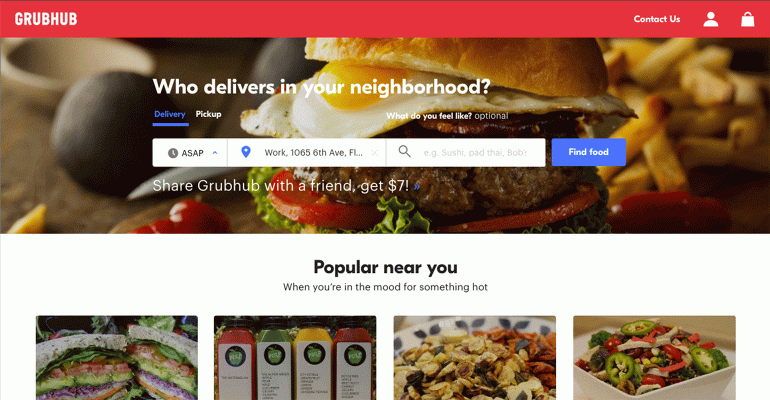In response to reports accusing Grubhub of creating copycat restaurant websites to boost its online order commissions, CEO Matt Maloney issued an email to employees Tuesday morning defending the brand and calling accusations of cyber-squatting “false” and “reckless” reporting.
“I want to be emphatic here: These stories are outright false. These allegations are untrue. And, those spreading false narratives are being reckless,” Maloney said in an internal email obtained by Nation’s Restaurant News.

Maloney is responding to recent reports by the New York Post and New Food Economy, alleging that the Chicago-based third-party aggregator creates doppelganger restaurant websites that, to the consumer, look legit. These sites, the reports stated, lure customers to ordering food which triggers a commission to Grubhub because the company owns the site. Orders made directly through a restaurant’s main website would not be subject to additional fees.
“While the duplicate web sites typically have the same menu as the restaurants do, the prices can be higher than the prices customers would have paid if they had ordered from these restaurants directly,” the New York Post said after reviewing a spreadsheet of thousands of websites allegedly created by Grubhub.
Maloney said Grubhub, which is one of the top two delivery operators in the U.S. by market share, does not set up restaurant websites without the permission of its restaurant partners. He said the practice of creating sites for clients was done as a service to restaurants to help them establish a digital presence when it was tougher five years ago.
“These orders made very little money for us, and in many cases we lost money,” he said in the memo.
The company stopped the practice in 2018 when it purchased Yelp’s delivery service Eat24.
“We provided this service before building a website was simple,” he said in the memo. “In fact, many restaurants requested this capability. We only set up websites or online ordering links at the request of a restaurant.”
New Food Economy interviewed one mom-and-pop restaurant owner in New York who claimed Grubhub created a replicate site of her business without her knowledge.
In a separate company statement, Grubhub said its past practice of registering domain names and creating websites for restaurants had been done with “explicit permission” from clients who signed contracts with the company.
“Grubhub charges restaurants close to zero in marketing commissions on orders that go through these websites. And we have always given restaurants the ability to assume control of any domain created for them at our sole cost and expense by emailing their account advisor,” the company said in a statement.
The copycat website controversy brings to light a major issue among restaurant owners as delivery becomes more popular among consumers. Many chains are complaining that they are losing control of their online presence as they become more reliant on third-party companies to do everything from delivery to developing loyalty programs. The solutions come at hefty prices, cutting into already thin profit margins. And, in some cases the third-party aggregators own valuable consumer data.
The impact delivery is having on restaurant operators was the subject of a New York City oversight hearing last week. In that hearing, delivery operators and restaurants debated the incrementality of delivery and the hefty commission fees associated with the service.
“The hearing confirmed our belief that restaurant operators desperately need aggregators, but that the relationship is past the honeymoon period,” BTIG analyst Peter Saleh said in a post-hearing report.
According to research firm Edison Trends, DoorDash has the largest market share in the U.S. Last summer, Edison Trends said GrubHub was leading competitors in market share of total consumer spend. But as of February 2019, DoorDash edged ahead of its peers to take the lead in the U.S. with 28% of market share, followed by 27% for Grubhub, 25% for Uber Eats and 12.1% for Postmates. The rest of the pie is divided by numerous small, and regional delivery players across the U.S., such as Caviar.
Contact Nancy Luna at [email protected]
Follow her on Twitter: @fastfoodmaven





